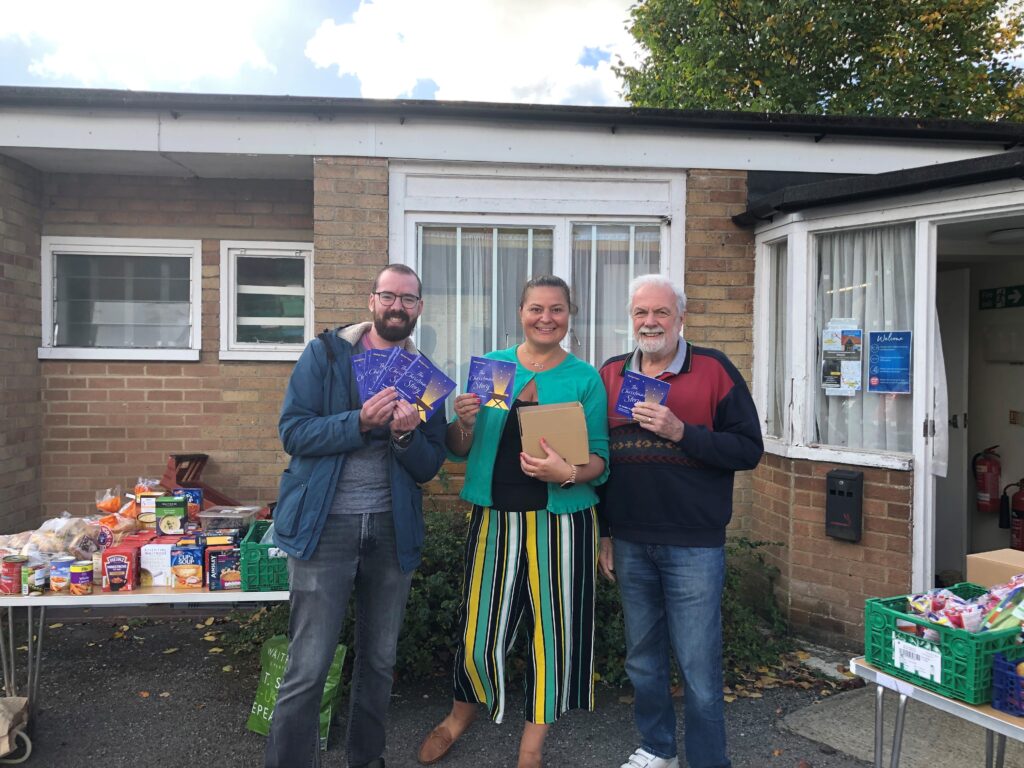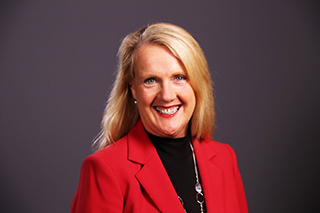In the last of our articles on the Holy Habit of gladness and generosity we’re delighted to hear from Lyn Weston of Christians Against Poverty (CAP) UK as she asks: what does it mean to make gladness and generosity a holy habit?
6 November 2022
When Christians Against Poverty (CAP) was founded in 1996, it was built on two foundations. The first was a desire to see people released from the crushing weight of debt and poverty; the second was to see local churches at the centre of this mission, on the ground, meeting people in their homes and putting God’s love into action.
Today, those foundations stand strong. Our vision is to see transformed lives, thriving churches and an end to UK poverty. Our services focus on the relief of debt and poverty across the UK, and each is delivered through a brilliant local church. Every day, staff and volunteers from local congregations meet people in their homes and provide a level of service that goes far beyond debt advice. They see the whole picture, taking into account the complex emotional toll that financial distress can take on a person.
And they act with generous hearts. This might look like responding to immediate needs, such as arranging a food shop for a family going hungry or a fuel top-up for someone who can’t afford to turn the heating on. It might be an invitation to church, where people who feel isolated can find community, new friendships, acceptance and love.
‘Our vision is to see transformed lives, thriving churches, and an end to UK poverty.’
As the cost of living continues to rise across the UK and, heartbreakingly, sees increasing numbers pushed to breaking point, this kind of all-round compassion is nothing short of life-changing.
Thriving churches with generous hearts
The church is at the centre of God’s mission to the world. We are called to be a counter-cultural community of hospitality and generosity, embodying Jesus to those around us, putting his love into action, especially when it comes to the poorest in our society. The opening words of Isaiah 61 paint a beautiful picture of God’s heart for the marginalised among us:
‘The Spirit of the Sovereign Lord is on me,
because the Lord has anointed me
to proclaim good news to the poor.
He has sent me to bind up the broken-hearted,
to proclaim freedom for the captives
and release from darkness for the prisoners…They will rebuild the ancient ruins
Isaiah 61:1, 4
and restore the places long devastated;
they will renew the ruined cities
that have been devastated for generations.’
‘We are called to be a countercultural community of hospitality and generosity, embodying Jesus to those around us.’
CAP equips churches with the tools to thrive as they address debt and poverty locally and serve their communities. But what does it mean to be a thriving church? First, it’s useful to understand what a thriving church isn’t. It isn’t about size or status. It isn’t about wealth or being well-known.
Mairi Giles, CAP debt centre manager at Central Church in Edinburgh, sums up beautifully just what a thriving church is:
‘Collectively as a church, our heart has increasingly broken for the poor and vulnerable in the city. For me, a thriving church is a place where people care about people who are struggling, who are lost, for whom life is difficult. Some people will come in and access our services and then leave again, but for others they find renewed hope, renewed strength, a home, a family and a reason to keep going.’

Above: BRF’s Matthew Duval delivers copies of The Christmas Story to the Abingdon food bank, as part of BRF’s virtual gifts initiative (see right).
What gladness it brings to see a life transformed
Poverty is an impenetrable wall that holds people back from living in freedom. Working in partnership with churches of all shapes, sizes, denominations and traditions, we at CAP are determined to break that wall down for every person who seeks our help.
Through polling commissioned from YouGov in August 2022, CAP found that 42% of people across the UK had borrowed money to cope with the rising cost of living. We want to see people living with the dignity of financial independence, and having equal opportunities to thrive and contribute to society – life in poverty rarely allows for that.
‘A thriving church is a place where people care about people who are struggling, who are lost, for whom life is difficult.’
The same poll found that 37% of those surveyed had cut out socialising and leisure activities in order to bring down costs. We know that debt and poverty drive isolation and loneliness, as almost eight in ten of our clients say they felt they had nobody to turn to when they had a problem.
Dragged down to the deepest, darkest depths, this leads many to give up hope and believe there is only one escape route. Devastatingly, our latest client survey revealed that 36% of CAP clients had considered or attempted suicide as a way out of debt and the numbers are rising month on month. We have to fix the root of the problem, so we can see this heart-breaking statistic fall.
Our prayer is to see families, friendships, relationships and self-confidence rebuilt. Most importantly, we want people to know their worth through their identity in Christ and experiencing the fullness of life that only he can provide. We cannot underestimate the power of local church staff and volunteers offering prayer to clients, and welcoming them into a supportive, loving community.
‘We cannot underestimate the power of local church staff and volunteers offering prayer to clients, and welcoming them into a supportive, loving community.’
Amanda’s story
The deep transformation we long to see for our clients is scarcely better exemplified than through the story of Amanda, who became debt free. For her, the issues she faced ran much deeper than her debt situation. When her mum was diagnosed with cancer, Amanda stopped work to care for her and the bills started to mount up.
‘Debt destroys everything,’ says Amanda, ‘your relationships, your mental health, your confidence.’ After an enforcement agent knocked on her door demanding money, it all became too much and she tried to end her life. But someone intervened and encouraged Amanda to get in touch with CAP. Shortly after, she was visited by Jane, a debt coach from the local church who helped to put her mind at ease.
Amanda’s only option for getting out of debt was a debt relief order, but to apply there was a fee to pay to the Insolvency Service. ‘My heart sank,’ says Amanda. ‘I didn’t have that sort of money.’ Thankfully CAP has an insolvency bursary fund to help people like Amanda. And after an invitation from Jane to join a church Bible course, Amanda reconnected with God.
‘Debt destroys everything… your relationships, your mental health, your confidence.’
Poverty robs people of opportunities to follow their dreams and grow, but surrounded by the compassion of her local church, now Amanda has set her sights on training to be a counsellor. Today, more and more people like Amanda are crying out for help.
An end to UK poverty
We believe that an end to UK poverty is both desirable and doable. Our biblical mandate expresses our understanding that the Bible begins from the inexhaustible abundance, relational wholeness and fruitfulness that is at the heart of creation, a state where crushing debt and poverty cannot exist. When Jesus returns, creation will be renewed (Isaiah 65:17), relationships between God and humanity will be restored (Micah 4:4) and poverty will be no more. Until then, as his people, we have a responsibility to act in ways that give our communities a foretaste of that world.
On a local level, we must strive for more churches that are well equipped to serve their communities, well versed in what the Bible says about poverty and passionate about finding opportunities to take action locally. On a national level, we must band together as the body of Christ, raising our voices to those in influence and calling for a just and compassionate society that reflects the coming kingdom of God. Together, we firmly believe we will see transformed lives, thriving churches and an end to UK poverty.
Scripture quotation is from The Holy Bible, New International Version®, NIV® Copyright © 1973, 1978, 1984, 2011 by Biblica, Inc.® Used by permission. All rights reserved worldwide.

Lyn Weston is UK director of church engagement and network at Christians Against Poverty. Her passion is to inspire a movement of change makers determined to eradicate poverty across the UK while sharing the good news of Christ.
Christians Against Poverty
Discover how your church can partner with CAP at capuk.org/partner or call 01274 760 580.
To find out more about CAP’s work and what life looks like for our clients before and after seeking help, please see capuk.org/clientreport.

Looking ahead to Remembrance Sunday next week, we have a selection of helpful resources on the theme remembrance go to our Resources Hub.
You’ll find ideas for all-age services on:

Messy Church has a Messy Remembrance session with free downloadable material.

Listen to Rachel Turner’s podcast on talking to children about remembrance.

BRF virtual gifts
We’ve been delighted with the response to our new virtual gifts initiative, and BRF staff, like Matthew Duval from the fundraising team, are busy packing up copies of The Upper Room and The Christmas Story for distribution to food banks, community kitchens, prisons and hospices.
If you’re wondering what to give the person who has everything this Christmas, how about a BRF ‘virtual gift’?
By ordering a virtual gift you’re making it possible for us to give away free copies of our Upper Room Bible reading notes and other resources like The Christmas Story booklet to bring God’s message of hope and love to those who need it most.
We welcome gifts of any amount, from £5 upwards. For example, every £10 helps us to supply 10 copies of The Christmas Story booklet to families accessing food banks this Christmas.
You’ll receive a downloadable gift note to print at home so there can be something under the tree.
